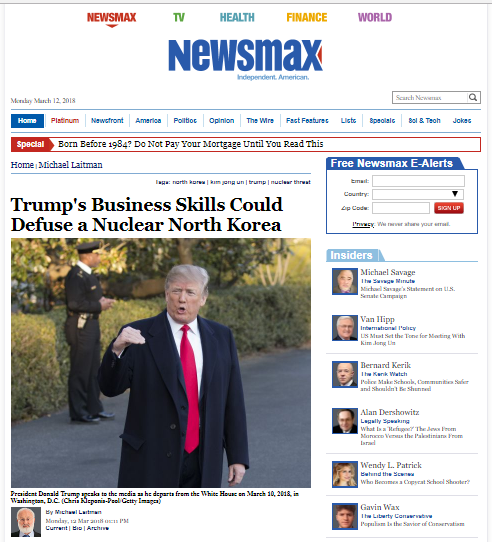
As I have expressed before, Trump is not another politician who comes from the business world. Rather, he is expanding the business world to include politics.
Previous U.S. presidents such as Clinton, Bush, and Obama had played with the idea of meeting with North Korea, but mostly hesitated. Likewise, political commentators will tell you that such a meeting requires months of preparation. But Trump, as usual, surprises everyone by making a quick move and saying he’s ready to meet, and soon.
That being said, let’s not be naïve. A diplomatic relationship between the White House and Pyongyang has surely been taking shape behind the scenes, and the invitation for a meeting didn’t come as a total surprise for the Trump administration.
Until a moment ago, the two leaders looked like bullies in a schoolyard, feeding the media by name-calling each other, and now they are setting a date for a possible peace summit? Once again, Trump proves that his politics shouldn’t be taken at face value, and media pundits are last to correctly interpret his fast moves.
Commentators are looking for the familiar style of diplomacy they have gotten far too used to: a well-mannered, predictable politician who says the right things and tries to be clear to everyone. But Trump is different. He brings to the political arena what he knows best: business.
Trump demonstrates a business-like pragmatism, aiming for the results he believes are good for America, while caring a lot less about what spectators understand when he positions himself to make a deal. Like a dedicated entrepreneur, he relates directly to the results he aims to achieve through his actions.
This also explains why rapid changes make perfect sense in Trump’s White House, albeit being portrayed as a mess by mainstream media. Today’s White House works more like a business, which can change more dynamically to meet its goals. When something or someone becomes inefficient, it can be modified or eliminated in a flexible way, which is counter to the political world that everyone is used to.
New Interdependent Reality Vs. Nuclear Capabilities
From a global perspective, we are marching toward an interdependent reality with every passing day. Whether we notice it or not, interdependence forces us to lay a new basis for international relations. In this context, I see Trump’s politics as helping the world go through a “reset” stage, shaking away pompous ideologies and politically correct habits that tend to inhibit our thinking and distort reality, so as to restart human relations from a pragmatic give-and-take stance.
What motivated Kim Jong Un to offer a meeting to President Trump?
The young North Korean dictator surely realizes that the most he can get from using his nuclear weapons is hurting a few enemies on the way to self-destruction. All the while, his people are hungry for bread as their neighbors from the South are well on their way to becoming a technological superpower.
In other words, beneath and above the surface, Trump’s moves may have helped Kim Jong Un recognize that he can get more from coming to terms with the U.S. than by standing behind his weapons of mass destruction. And if this is what’s happening, Trump’s uncanny politics could be defusing the atomic regime that threatens the world.
Featured in Newsmax